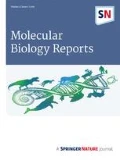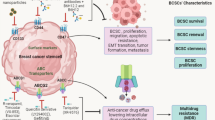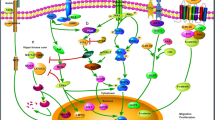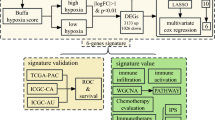Abstract
Colorectal cancer (CRC) is ranked third most incident and second most deadly around the world, and even though treatments significantly developed over the years, overall survival remains low. This scenario has the contribution of cancer stem cells (CSC), a subpopulation of the heterogeneous tumor bulk, considered to be responsible for the tumor maintenance, conventional therapies resistance, metastasis, and recurrence. In this regard, hypoxia appears as an important component of tumor microenvironment and CSC niche, being associated with a worse prognosis. Therefore, it is vital the study of hypoxia influence on CSC phenotype in CRC. The aim of this mini-review article is to present a brief overview on this field. Recent articles discoursed about CSC molecular regulation, signalling pathways, methods for the study of the topic, as well as molecules and drugs capacity of inhibiting the interplay of hypoxia-CSC. Finally, the studies demonstrated important results, extensively accessing the topics of cellular and molecular regulation and therapeutic intervention, being morphology an area to be more explored.

Similar content being viewed by others
Data availability
All data analyzed by this study are included in this article.
Code availability
Not applicable.
References
Bray F, Ferlay J, Soerjomataram I, Siegel RL, Torre LA, Jemal A (2018) Global cancer statistics 2018: GLOBOCAN estimates of incidence and mortality worldwide for 36 cancers in 185 countries. CA Cancer J Clin 68:394–424. https://doi.org/10.3322/caac.21492
Van Der Jeught K, Xu HC, Li YJ, Lu X, Bin, Ji G (2018) Drug resistance and new therapies in colorectal cancer. World J Gastroenterol 24:3834–3848. https://doi.org/10.3748/wjg.v24.i34.3834
Batlle E, Clevers H (2017) Cancer stem cells revisited. Nat Med 23:1124–1134. https://doi.org/10.1038/nm.4409
Eun K, Ham SW, Kim H (2017) Cancer stem cell heterogeneity: origin and new perspectives on CSC targeting. BMB Rep 50:117–125. https://doi.org/10.5483/BMBRep.2017.50.3.222
Lytle NK, Barber AG, Reya T (2018) Stem cell fate in cancer growth, progression and therapy resistance. Nat Rev Cancer 18:669–680. https://doi.org/10.1038/s41568-018-0056-x
Nassar D, Blanpain C (2016) Cancer stem cells: basic concepts and therapeutic implications. Annu Rev Pathol Mech Dis 11:47–76. https://doi.org/10.1146/annurev-pathol-012615-044438
Dongre A, Weinberg RA (2019) New insights into the mechanisms of epithelial–mesenchymal transition and implications for cancer. Nat Rev Mol Cell Biol 20:69–84. https://doi.org/10.1038/s41580-018-0080-4
O’Brien CA, Pollett A, Gallinger S, Dick JE (2007) A human colon cancer cell capable of initiating tumour growth in immunodeficient mice. Nature 445:106–110. https://doi.org/10.1038/nature05372
Zeuner A, Todaro M, Stassi G, De Maria R (2014) Colorectal cancer stem cells: from the crypt to the clinic. Cell Stem Cell 15:692–705. https://doi.org/10.1016/j.stem.2014.11.012
Zhou Y, Xia L, Wang H, Oyang L, Su M, Liu Q et al (2018) Cancer stem cells in progression of colorectal cancer. Oncotarget 9:33403–33415. https://doi.org/10.18632/oncotarget.23607
Gupta R, Bhatt LK, Johnston TP, Prabhavalkar KS (2019) Colon cancer stem cells: potential target for the treatment of colorectal cancer. Cancer Biol Ther 20:1068–1082. https://doi.org/10.1080/15384047.2019.1599660
Höckel M, Vaupel P (2001) Tumor hypoxia: definitions and current clinical, biologic, and molecular aspects. J Natl Cancer Inst 93:266–276. https://doi.org/10.1093/jnci/93.4.266
Greenspan HP (1972) Models for the growth of a solid tumor by diffusion. Stud Appl Math 51:317–340. https://doi.org/10.1002/sapm1972514317
Bersten DC, Sullivan AE, Peet DJ, Whitelaw ML (2013) BHLH-PAS proteins in cancer. Nat Rev Cancer 13:827–841. https://doi.org/10.1038/nrc3621
Keith B, Johnson RS, Simon MC (2012) HIF1 α and HIF2 α: sibling rivalry in hypoxic tumour growth and progression. Nat Rev Cancer 12:9–22. https://doi.org/10.1038/nrc3183
Semenza GL (2003) Targeting HIF-1 for cancer therapy. Nat Rev Cancer 3:721–732. https://doi.org/10.1038/nrc1187
Wigerup C, Påhlman S, Bexell D (2016) Therapeutic targeting of hypoxia and hypoxia-inducible factors in cancer. Pharmacol Ther 164:152–169. https://doi.org/10.1016/j.pharmthera.2016.04.009
Simon MC, Keith B (2008) The role of oxygen availability in embryonic development and stem cell function. Nat Rev Mol Cell Biol 9:285–296. https://doi.org/10.1038/nrm2354
Carnero A, Lleonart M (2016) The hypoxic microenvironment: a determinant of cancer stem cell evolution. Insid Cell 1:96–105. https://doi.org/10.1002/bies.201670911
Dong HJ, Jang GB, Lee HY, Park SR, Kim JY, Nam JS et al (2016) The Wnt/β-catenin signaling/Id2 cascade mediates the effects of hypoxia on the hierarchy of colorectal-cancer stem cells. Sci Rep 6:1–13. https://doi.org/10.1038/srep22966
Giles RH, Lolkema MP, Snijckers CM, Belderbos M, Van Der Groep P, Mans DA et al (2006) Interplay between VHL/HIF1α and Wnt/β-catenin pathways during colorectal tumorigenesis. Oncogene 25:3065–3070. https://doi.org/10.1038/sj.onc.1209330
Yeung TM, Gandhi SC, Bodmer WF (2011) Hypoxia and lineage specification of cell line-derived colorectal cancer stem cells. Proc Natl Acad Sci USA 108:4382–4387. https://doi.org/10.1073/pnas.1014519107
Hanahan D, Weinberg RA (2011) Hallmarks of cancer: the next generation. Cell 144:646–674. https://doi.org/10.1016/j.cell.2011.02.013
Goodall GJ, Wickramasinghe VO (2021) RNA in cancer. Nat Rev Cancer 21:22–36. https://doi.org/10.1038/s41568-020-00306-0
Fanale D, Barraco N, Listì A, Bazan V, Russo A (2016) Non-coding RNAs functioning in colorectal cancer stem cells. Adv Exp Med Biol 937:93–108. https://doi.org/10.1007/978-3-319-42059-2_5
Khan A, Ahmed E, Elareer N, Junejo K, Steinhoff M, Uddin S (2019) Role of miRNA-regulated cancer stem cells in the pathogenesis of human malignancies. Cells 8:840. https://doi.org/10.3390/cells8080840
Shirmohamadi M, Eghbali E, Najjary S, Mokhtarzadeh A, Kojabad AB, Hajiasgharzadeh K et al (2020) Regulatory mechanisms of microRNAs in colorectal cancer and colorectal cancer stem cells. J Cell Physiol 235:776–789. https://doi.org/10.1002/jcp.29042
Yao J, Li J, Geng P, Li Y, Chen H, Zhu Y (2015) Knockdown of a HIF-2α promoter upstream long noncoding RNA impairs colorectal cancer stem cell properties in vitro through HIF-2α downregulation. Onco Targets Ther 8:3467–3474. https://doi.org/10.2147/OTT.S81393
Ullmann P, Qureshi-Baig K, Rodriguez F, Ginolhac A, Nonnenmacher Y, Ternes D et al (2016) Hypoxia-responsive miR-210 promotes self-renewal capacity of colon tumor-initiating cells by repressing ISCU and by inducing lactate production. Oncotarget 7:65454–65470. https://doi.org/10.18632/oncotarget.11772
Ullmann P, Nurmik M, Schmitz M, Rodriguez F, Weiler J, Qureshi-Baig K et al (2019) Tumor suppressor miR-215 counteracts hypoxia-induced colon cancer stem cell activity. Cancer Lett 450:32–41. https://doi.org/10.1016/j.canlet.2019.02.030
Lai HT, Chiang CT, Tseng WK, Chao TC, Su Y (2020) GATA6 enhances the stemness of human colon cancer cells by creating a metabolic symbiosis through upregulating LRH-1 expression. Mol Oncol 14:1327–1347. https://doi.org/10.1002/1878-0261.12647
Bian J, Dannappel M, Wan C, Firestein R (2020) Transcriptional regulation of Wnt/β-catenin pathway in colorectal cancer. Cells 9:1–29. https://doi.org/10.3390/cells9092125
Oncol WJH, Zhang Y, Wang X (2020) Targeting the Wnt/β- catenin signaling pathway in cancer. J Hematol Oncol. https://doi.org/10.1186/s13045-020-00990-3
Lee S, Rauch J, Kolch W (2020) Targeting MAPK signaling in cancer: mechanisms of drug resistance and sensitivity. Int J Mol Sci 21:1–29. https://doi.org/10.3390/ijms21031102
Hou PC, Li YH, Lin SC, Lin SC, Lee JC, Lin BW et al (2017) Hypoxia-induced downregulation of DUSP-2 phosphatase drives colon cancer stemness. Cancer Res 77:4305–4316. https://doi.org/10.1158/0008-5472.can-16-2990
Folkerts H, Hilgendorf S, Vellenga E, Bremer E, Wiersma VR (2019) The multifaceted role of autophagy in cancer and the microenvironment. Med Res Rev 39:517–560. https://doi.org/10.1002/med.21531
Li X, He S, Ma B (2020) Autophagy and autophagy-related proteins in cancer. Mol Cancer Mol Cancer 19:1–16. https://doi.org/10.1186/s12943-020-1138-4
Wei R, Xiao Y, Song Y, Yuan H, Luo J, Xu W (2019) FAT4 regulates the EMT and autophagy in colorectal cancer cells in part via the PI3K-AKT signaling axis. J Exp Clin Cancer Res 38:1–14. https://doi.org/10.1186/s13046-019-1043-0
Ma Z, Lou S, Jiang Z (2020) PHLDA2 regulates EMT and autophagy in colorectal cancer via the PI3K/AKT signaling pathway. Aging (Albany NY) 12:7985–8000. https://doi.org/10.18632/aging.103117
Shi L, Yan H, An S, Shen M, Jia W, Zhang R et al (2019) SIRT5-mediated deacetylation of LDHB promotes autophagy and tumorigenesis in colorectal cancer. Mol Oncol 13:358–375. https://doi.org/10.1002/1878-0261.12408
Qureshi-Baig K, Kuhn D, Viry E, Pozdeev VI, Schmitz M, Rodriguez F et al (2020) Hypoxia-induced autophagy drives colorectal cancer initiation and progression by activating the PRKC/PKC-EZR (ezrin) pathway. Autophagy 16:1436–1452. https://doi.org/10.1080/15548627.2019.1687213
Vara-Perez M, Felipe-Abrio B, Agostinis P (2019) Mitophagy in cancer: a tale of adaptation. Cells 8:493. https://doi.org/10.3390/cells8050493
Junttila MR, De Sauvage FJ (2013) Influence of tumour micro-environment heterogeneity on therapeutic response. Nature 501:346–354. https://doi.org/10.1038/nature12626
Fatrai S, Van Schelven SJ, Ubink I, Govaert KM, Raats D, Koster J et al (2015) Maintenance of clonogenic KIT+ human colon tumor cells requires secretion of stem cell factor by differentiated tumor cells. Gastroenterology 149:692–704. https://doi.org/10.1053/j.gastro.2015.05.003
Tang YA, Chen Y, Feng, Bao Y, Mahara S, Yatim SMJM, Oguz G et al (2018) Hypoxic tumor microenvironment activates GLI2 via HIF-1α and TGF-β2 to promote chemoresistance in colorectal cancer. Proc Natl Acad Sci USA 115:5990–5999. https://doi.org/10.1073/pnas.1801348115
Nyga A, Cheema U, Loizidou M (2011) 3D tumour models: novel in vitro approaches to cancer studies. J Cell Commun Signal 5:239–248. https://doi.org/10.1007/s12079-011-0132-4
Paolillo M, Colombo R, Serra M, Belvisi L, Papetti A, Ciusani E et al (2019) Stem-like cancer cells in a dynamic 3D culture system: a model to study metastatic cell adhesion and anti-cancer drugs. Cells. https://doi.org/10.3390/cells8111434
Zhang C, Yang Z, Dong DL, Jang TS, Knowles JC, Kim HW et al (2020) 3D culture technologies of cancer stem cells: promising ex vivo tumor models. J Tissue Eng 11:204173142093340
Stankevicius V, Kunigenas L, Stankunas E, Kuodyte K, Strainiene E, Cicenas J et al (2017) The expression of cancer stem cell markers in human colorectal carcinoma cells in a microenvironment dependent manner. Biochem Biophys Res Commun 484:726–733. https://doi.org/10.1016/j.bbrc.2017.01.111
Wohlleben G, Hauff K, Gasser M, Waaga-Gasser AM, Grimmig T, Flentje M et al (2018) Hypoxia induces differential expression patterns of osteopontin and CD44 in colorectal carcinoma. Oncol Rep 39:442–448. https://doi.org/10.3892/or.2017.6068
Okada M, Kawai K, Sonoda H, Shiratori H, Kishikawa J, Nagata H et al (2021) Epithelial–mesenchymal transition and metastatic ability of CD133+ colorectal cancer stem-like cells under hypoxia. Oncol Lett 21:1–9. https://doi.org/10.3892/ol.2020.12280
Min SJ, Lim JY, Kim HR, Kim SJ, Kim Y (2015) Sasa quelpaertensis leaf extract inhibits colon cancer by regulating cancer cell stemness in vitro and in vivo. Int J Mol Sci 16:9976–9997. https://doi.org/10.3390/ijms16059976
Wu C, Zhuang Y, Zhou J, Liu S, Wang R, Shu P (2019) Cinnamaldehyde enhances apoptotic effect of oxaliplatin and reverses epithelial-mesenchymal transition and stemnness in hypoxic colorectal cancer cells. Exp Cell Res 383:111500. https://doi.org/10.1016/j.yexcr.2019.111500
Haynes J, McKee TD, Haller A, Wang Y, Leung C, Gendoo DMA et al (2018) Administration of hypoxia-activated prodrug evofosfamide after conventional adjuvant therapy enhances therapeutic outcome and targets cancer-initiating cells in preclinical models of colorectal cancer. Clin Cancer Res 24:2116–2127. https://doi.org/10.1158/1078-0432.CCR-17-1715
Kotlarz A, Przybyszewska M, Swoboda P, Neska J, Miłoszewska J, Grygorowicz MA et al (2019) Imatinib inhibits the regrowth of human colon cancer cells after treatment with 5-FU and cooperates with vitamin D analogue PRI-2191 in the downregulation of expression of stemness-related genes in 5-FU refractory cells. J Steroid Biochem Mol Biol 189:48–62. https://doi.org/10.1016/j.jsbmb.2019.02.003
Przybyszewska M, Miłoszewska J, Kotlarz A, Swoboda P, Pyśniak K, Szczepek W et al (2017) Imatinib inhibits the renewal and tumorigenicity of CT-26 colon cancer cells after cytoreductive treatment with doxorubicin. Arch Immunol Ther Exp (Warsz) 65:51–67. https://doi.org/10.1007/s00005-016-0391-0
To KKW, Poon DC, Wei Y, Wang F, Lin G, Fu LW (2015) Vatalanib sensitizes ABCB1 and ABCG2-overexpressing multidrug resistant colon cancer cells to chemotherapy under hypoxia. Biochem Pharmacol 97:27–37. https://doi.org/10.1016/j.bcp.2015.06.034
Yoshii Y, Furukawa T, Matsumoto H, Yoshimoto M, Kiyono Y, Zhang MR et al (2016) 64Cu-ATSM therapy targets regions with activated DNA repair and enrichment of CD133+ cells in an HT-29 tumor model: sensitization with a nucleic acid antimetabolite. Cancer Lett 376:74–82. https://doi.org/10.1016/j.canlet.2016.03.020
Lee YT, Tan YJ, Oon CE (2018) Molecular targeted therapy: treating cancer with specificity. Eur J Pharmacol 834:188–196. https://doi.org/10.1016/j.ejphar.2018.07.034
Piawah S, Venook AP (2019) Targeted therapy for colorectal cancer metastases: a review of current methods of molecularly targeted therapy and the use of tumor biomarkers in the treatment of metastatic colorectal cancer. Cancer 125:4139–4147. https://doi.org/10.1002/cncr.32163
Acknowledgements
The authors are grateful for Carlos Chagas Filho Foundation for Research Support of the State of Rio de Janeiro.
Funding
This study was funded by Carlos Chagas Filho Foundation for Research Support of the State of Rio de Janeiro.
Author information
Authors and Affiliations
Contributions
Conceptualization: [MDAR], [ALM], [AAT]; Literature search, data analysis and manuscript draft: [MDAR]; Critical revision: [ALM], [AAT].
Corresponding author
Ethics declarations
Conflict of interest
The authors declare that they have no conflict of interest.
Ethical approval
Not applicable.
Consent to participate
All authors have consented to participate of the manuscript production.
Consent for publication
All authors have read and approved the manuscript for publication.
Additional information
Publisher's Note
Springer Nature remains neutral with regard to jurisdictional claims in published maps and institutional affiliations.
Rights and permissions
About this article
Cite this article
Rainho, M.d.A., Mencalha, A.L. & Thole, A.A. Hypoxia effects on cancer stem cell phenotype in colorectal cancer: a mini-review. Mol Biol Rep 48, 7527–7535 (2021). https://doi.org/10.1007/s11033-021-06809-9
Received:
Accepted:
Published:
Issue Date:
DOI: https://doi.org/10.1007/s11033-021-06809-9




